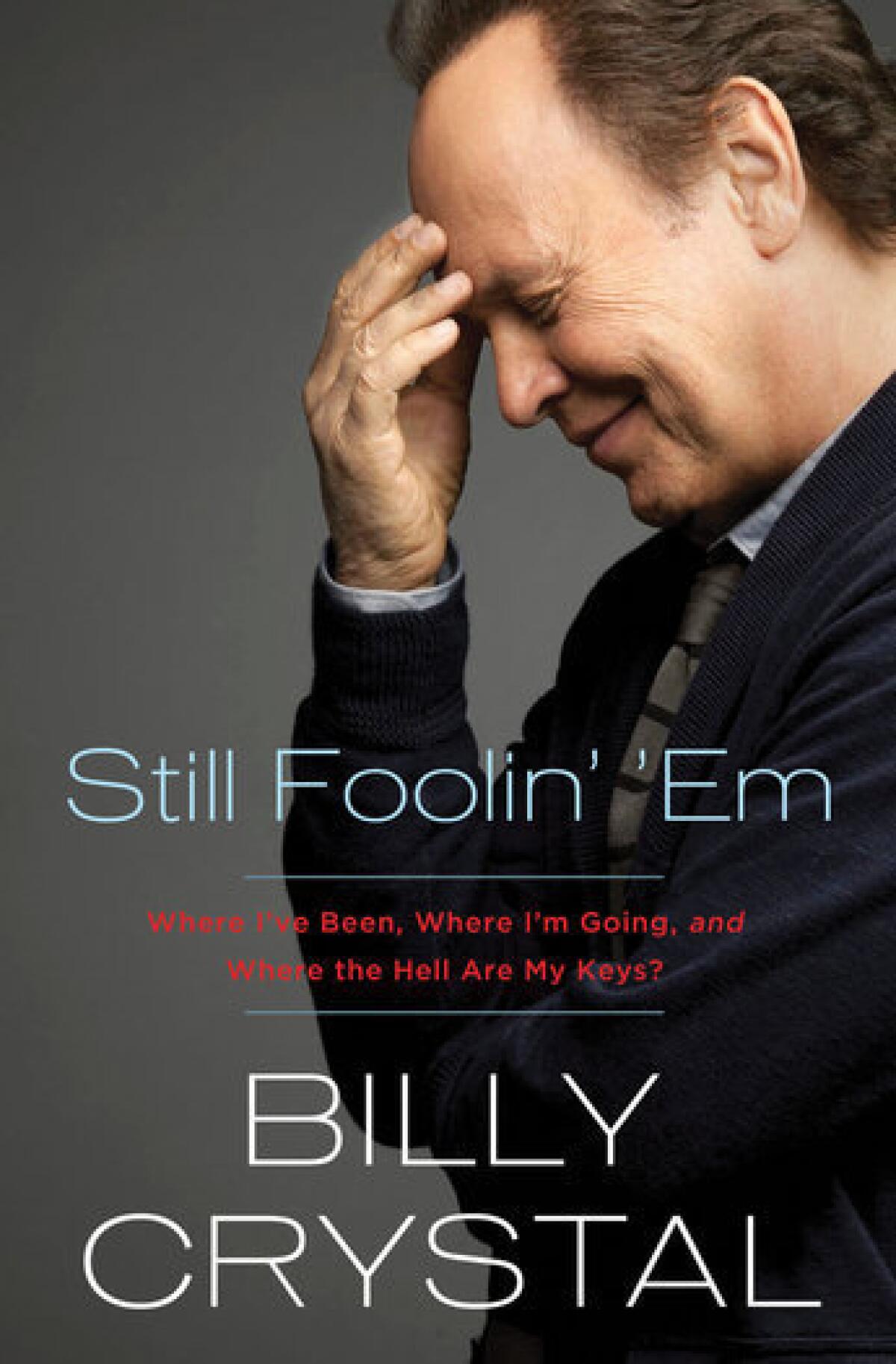Billy Crystal’s storytelling trumps kvetching in ‘Still Foolin’ ‘Em’

- Share via
Is Billy Crystal’s new memoir funny?
Well, he gets sucker-punched by a white-haired Joe DiMaggio. He gets cussed out by Charles Bronson for sending him the screenplay to “City Slickers.” “I’m dead on page sixty four!” Bronson yells. (Jack Palance took the part instead and won an Academy Award).
Then, at Howard Cosell’s funeral, Muhammad Ali asks with a whisper if the recently deceased sportscaster is “wearing his hairpiece” inside his closed casket.
“I don’t think so,” Crystal says.
“Then how will God recognize him?” Ali asks.
“Once Howard starts complaining,” Crystal retorts, “God will know it’s him.”
In other words, as they say in the comedy business, Billy Crystal’s new book isn’t just funny. It “kills.”
In “Still Foolin’ ‘Em: Where I’ve Been, Where I’m Going, and Where the Hell Are My Keys?” Crystal ties together his reflections on aging with an engaging account of his childhood, youth and the many adventures of 45-year career as comedian, actor and filmmaker.
Early on in “Still Foolin’ ‘Em,” Crystal admits to a handicap he had to overcome when he was just starting to do stand-up comedy circa 1970.
“I wasn’t a strong one-liner joke writer,” he says. Instead, Crystal the comedian would learn to hold an audience and keep them laughing by telling stories and creating characters: be they real people, like Ali (who Crystal often imitated with great comic effect), or made-up ones, like Lew Goldman, an old Jewish weatherman who did the forecast on “Saturday Night Live” — but only for the block where his family lived.
Those same qualities as a storyteller serve Crystal well in “Still Foolin’ ‘Em,” a book that moves from one funny, strange and heartfelt moment to the next as smoothly as the best of the nine Academy Awards shows Crystal hosted.
We meet the late Johnny Carson (in this account, as in others, he’s portrayed as the beneficent Saint of Stand-Up Comedy), Sam Davis Jr., and an aging Mickey Mantle (Crystal ends up rescuing his childhood idol from a drunken stupor more than once).
Born in New York in 1948, Crystal is a member of the boomer generation, and as the book opens, he’s just turned 65 and isn’t happy. “At sixty-five, you’re always a little cold,” he writes. “Even the new thicket of hair on your back doesn’t help.”
Senior-Citizen Billy Crystal isn’t quite as funny in “Still Foolin’ ‘Em” as Teen Billy Crystal or even Middle-Aged Billy Crystal. Senior Billy Crystal’s chapter-long rant about all the things that annoy him these days — from cats and TSA personnel to the overweight (“worst of all, they let their kids get fat”) — is one of the book’s few off-key moments.
Fortunately, there’s a lot more fun than kvetching in “Still Foolin’ ‘Em.” Billy Crystal made it to the top, in part, by embracing humility and his own small stature. He’s 5-foot-8 but Lew Alcindor, later known as Kareem Abdul-Jabbar, was his high school pal.
Crystal’s father ran a popular jazz record store in Manhattan. Louis Armstrong was a family friend and jazz musicians jammed at Billy’s bar mitzvah. His father saw Crystal perform only once, during a high school talent night at which Crystal’s true talents (he was a B-minus student) were on public display for the first time.
“He died suddenly the next fall, and my childhood came to a screeching halt,” Crystal writes. He was 14, but “I never felt young again.”
Crystal’s description of the loss that haunted his family is terse. “I never felt I could have a weak moment in front of [my mother], which, frankly, was exhausting.” His sense of humor carries him through, of course, and later he channels his inner child to survive the incredible high-wire act of being a rookie stand-up comedian. His early gigs include an eventful turn opening for “Blood, Sweat & Tears” and an appearance at the Catch a Rising Star club in New York that leads to some sage advice from manager Jack Rollins.
“Don’t work so safe, don’t be afraid to bomb,” Rollins tells him. “Let me know how you feel about things.... Put you in your material.”
Crystal follows the advice — and bombs his next time on stage, one of several setbacks he recounts without rancor or enmity. Later, Crystal plays the first openly gay character on a network sitcom, on “Soap.” It’s one more step toward national fame.
Many more adventures follow. For example, a comedy show Crystal puts on in the old Soviet Union, and a visit to a synagogue in Leningrad (as it was known then). The ultra-strict elders won’t let him in the temple without covering his head with a yarmulke, so Crystal makes one by cutting up a velvet Elvis painting he buys nearby. “Elvis had entered the building,” Crystal writes.
Crystal the comedian will do almost anything to get a laugh. Crystal the writer allows himself to flop at the box office, and suffers the many indignities of old age, with his teenage sweetheart and wife of 43 years still alongside him. In the end, the reader concludes that Crystal isn’t just funny: He’s a mensch too.
Still Foolin’ Em’
Where I’ve Been, Where I’m Going, and Where the Hell Are My Keys?
Billy Crystal
Henry Holt: 288 pp., $28
More to Read
Sign up for our Book Club newsletter
Get the latest news, events and more from the Los Angeles Times Book Club, and help us get L.A. reading and talking.
You may occasionally receive promotional content from the Los Angeles Times.









